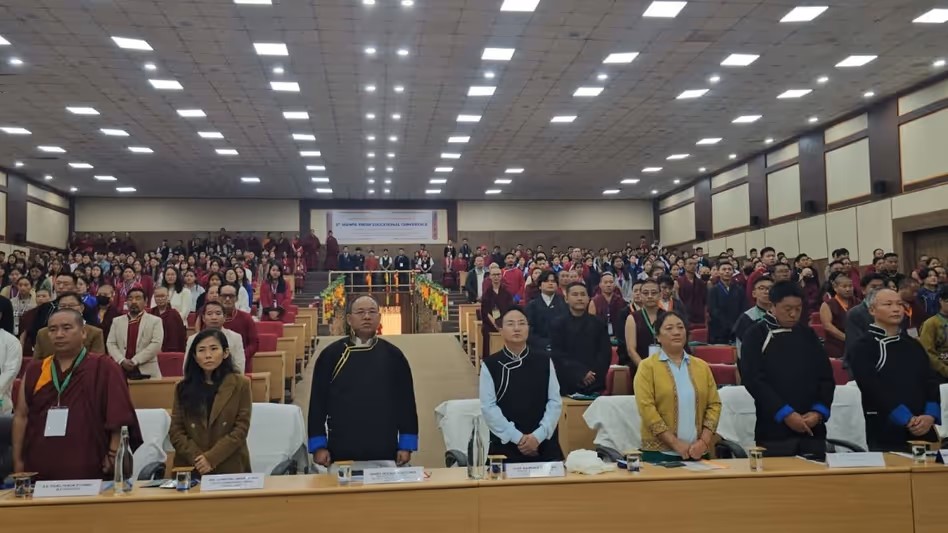
Arunachal Pradesh: Tawang Hosts Inaugural Monpa Youth Educational Conference to Nurture Future Leaders

 :
| Updated On: 04-Oct-2025 @ 5:49 pm
:
| Updated On: 04-Oct-2025 @ 5:49 pmSHARE
Tawang recently hosted the inaugural Monpa Youth Educational Conference, marking a significant step in promoting education, cultural preservation, and leadership among the Monpa community in Arunachal Pradesh. The conference attracted a diverse group of participants, including young students, spiritual leaders, policymakers, and community representatives, creating a vibrant platform for discussion and exchange of ideas. The primary focus of the event was to empower Monpa youth with knowledge, skills, and a sense of pride in their identity, fostering a connection with their cultural heritage while preparing them to assume leadership roles in the future.
Arunachal Pradesh Home Minister Mama Natung, who also oversees the Public Health Engineering (PHE) department and serves as the Guardian Minister of Tawang, attended the conference along with other notable figures, including MLA Namgey Tsering, HE Doley Rinpoche, HE Tulku Tenzin Gyurmey, MLA Lungla Tsering Lhamu, ZPC Tawang Leki Gombu, and Deputy Commissioner Namgyal Angmo. Their presence underscored the importance of the conference as a high-profile platform for youth engagement. The event facilitated meaningful interactions between Monpa youth and intellectuals, senior citizens, and members of the International Tibetan College Students Association. These interactions provided opportunities for young participants to gain insights into their traditions, understand the significance of preserving Monpa dialects, and learn about sustaining the Himalayan Buddhist heritage.
During the conference, discussions emphasized the need to connect younger generations with their cultural roots while equipping them with modern skills necessary for personal and community development. The sessions highlighted how cultural awareness and leadership training could empower youth to contribute effectively to society, ensuring that the Monpa community remains vibrant and resilient. Participants engaged enthusiastically in workshops and dialogue sessions designed to strengthen leadership qualities, encourage collective responsibility, and promote awareness of cultural values. The conference served not only as a learning platform but also as a space for youth to voice their ideas, concerns, and aspirations regarding the future of their community.
Following the conclusion of the conference, Minister Natung chaired a review meeting to assess the progress of centrally sponsored, state-sponsored, and flagship development programs in Tawang. The meeting focused on the effective implementation of developmental initiatives, identifying challenges and opportunities to enhance the impact of these programs on local communities. By linking youth empowerment efforts with broader developmental objectives, the government aims to create an environment where young people can actively participate in shaping the social, economic, and cultural trajectory of their district and the state.
In his address, Minister Natung highlighted the significance of such platforms in guiding social development and inspiring youth to contribute to both community welfare and national progress. He emphasized that by providing young people with access to education, mentorship, and leadership opportunities, Arunachal Pradesh can cultivate a generation of responsible, skilled, and culturally aware leaders. The participants responded with enthusiasm, engaging actively in all sessions and demonstrating their commitment to applying the knowledge and skills gained during the conference to benefit their communities.
The conference concluded with calls for continued knowledge-sharing, collaboration, and unity among Monpa youth. Attendees were encouraged to take an active role in preserving cultural heritage, promoting educational development, and contributing to the socio-economic growth of Tawang and the broader state. By fostering leadership, cultural pride, and collective responsibility, the inaugural Monpa Youth Educational Conference laid the foundation for nurturing future leaders who are well-equipped to address the challenges and opportunities facing their community and Arunachal Pradesh as a whole.
In summary, the Tawang conference provided a comprehensive platform for Monpa youth to engage with cultural, educational, and leadership initiatives, bridging generational gaps and creating pathways for active participation in community and state development. It emphasized the integration of cultural preservation with modern skills and leadership training, aiming to ensure that the Monpa youth are empowered to shape a sustainable, prosperous, and culturally vibrant future.